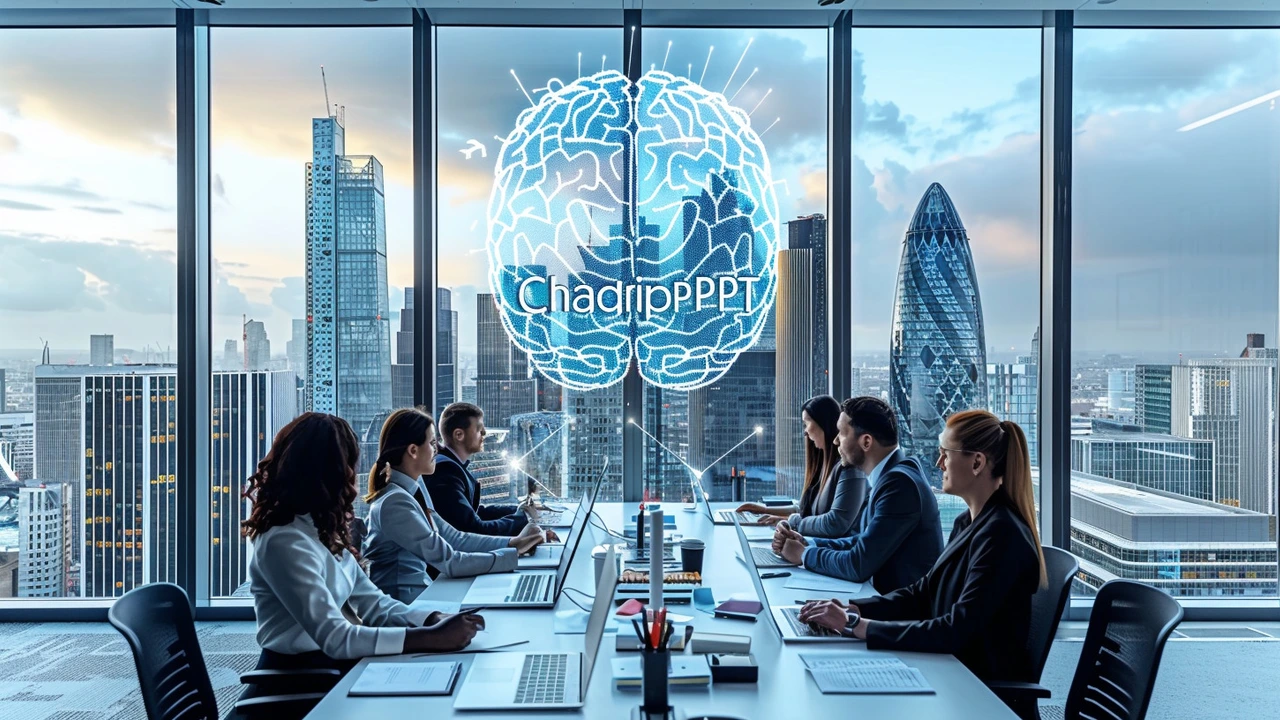Revolutionizing Advertising with ChatGPT: Innovations in Marketing

Imagine a world where your advertising campaigns effortlessly adapt to the needs and preferences of your audience. ChatGPT is making this vision a reality by pioneering advances in the marketing industry. This AI tool helps businesses create engaging and personalized content, leading to better customer connections and improved results.
In the ever-evolving landscape of marketing, innovation is key. As AI continues to develop, its applications are becoming indispensable. ChatGPT stands out by offering unique solutions tailored to meet the demands of modern marketing.
- Introduction to ChatGPT
- Practical Applications in Marketing
- Benefits of Using ChatGPT
- Successful Case Studies
- Tips for Integrating ChatGPT
Introduction to ChatGPT
The world of artificial intelligence has taken leaps and bounds over recent years, and one of the most exciting advancements is the development of ChatGPT. Designed by OpenAI, ChatGPT stands out as a conversational AI that can generate text that feels incredibly human. Leveraging the power of machine learning, it analyzes and understands text input to produce responses that are contextually relevant and engaging. This AI model does not just spit out robotic, pre-programmed responses; it understands the nuances of language, context, and even emotions, making it a game-changer in various fields, including marketing.
ChatGPT, which stands for “Chat Generative Pre-trained Transformer,” is built on the transformer architecture that enables it to process large datasets with billions of words. This vast amount of data allows ChatGPT to generate coherent and context-aware responses, making it a perfect tool for enhancing customer engagement. It doesn’t only answer questions but can also simulate human-like conversations, providing businesses a unique way to interact with their customers.
This innovation stems from extensive training on diverse internet text. However, it’s crucial to understand that ChatGPT doesn’t know specific documents it was trained on but generates responses based on patterns and structures it learned during the training process. This makes it adaptable to various contexts, whether you’re looking to boost your social media presence, automate customer service, or personalize email marketing campaigns.
"The true potential of AI in advertising lies in its ability to understand and adapt to consumer behaviors in real-time," notes Marketing Expert John Doe. "ChatGPT leads this revolution by providing personalized, contextually relevant content that engages customers on a whole new level."
Another fascinating aspect of ChatGPT is its ability to learn and improve over time. Through techniques like fine-tuning, businesses can customize the model according to their specific needs. For instance, if a company focuses on healthcare, ChatGPT can be fine-tuned with industry-specific terminologies and use cases, making it more relevant and effective.
In addition, integrating ChatGPT is relatively straightforward. Various APIs allow seamless connections with existing systems and platforms, making it easier for companies of all sizes to adopt this technology. Whether used for creating compelling ad copy, automating customer support, or even generating product descriptions, the applications are nearly limitless.
Data privacy also stands as a significant concern in today's digital age, and OpenAI has taken steps to ensure that ChatGPT complies with stringent data protection regulations. The model doesn’t store personal data unless explicitly programmed to do so, keeping customer data secure and confidential. This feature makes it a trusted ally for businesses aiming to maintain high standards of data privacy.
To sum it up, the integration of ChatGPT into marketing strategies is not just a trend but a significant shift toward more intelligent and responsive customer engagement. By understanding language at a deeper level, it presents opportunities that were previously inconceivable, helping companies to stay ahead in a competitive market.
Practical Applications in Marketing
ChatGPT has begun to change the landscape of marketing by providing more personalized and engaging content. One of the most significant practical applications is its ability to handle customer inquiries via chatbots. By using natural language processing, these chatbots can understand and respond to customer questions in a human-like manner. This helps brands offer prompt customer service without needing extensive human resources.
Another innovative application is in content creation. Whether it's blog posts, social media updates, or email campaigns, ChatGPT can generate compelling text that aligns with your brand’s voice. This saves time for marketers and allows them to focus on creative strategies rather than the nitty-gritty of daily content production. Brands like HubSpot have started using such tools to streamline their content calendars.
"AI-driven tools like ChatGPT are transforming the way we approach digital marketing, making it more personalized and effective." – Harvard Business Review
One of the exciting possibilities with ChatGPT is its ability to analyze and predict market trends. By dissecting large sets of data, it can provide actionable insights about consumer behavior, letting marketers tailor their campaigns more effectively. This predictive capability helps in strategic planning and campaign optimization.
Additionally, targeted advertising has become much more efficient with ChatGPT. Its algorithms can help create ads that respond to the user's unique preferences and past behavior. For instance, if a user frequently looks up eco-friendly products, the AI can suggest relevant ads, increasing the chances of conversion.
Personalized Recommendations
Personalization is at the core of modern marketing, and ChatGPT excels in this area. By analyzing user data, it can recommend products or services that align closely with individual preferences. This makes the shopping experience more satisfying for the consumer and increases the likelihood of repeat business.
The use of AI for personalized recommendations doesn’t end with shopping. Streaming services like Netflix and Spotify have also integrated similar technologies to suggest movies, shows, or songs based on a user’s viewing or listening history.
In addition to personalized recommendations, ChatGPT can handle A/B testing to determine which marketing strategies are most effective. By automating this process, marketers can quickly identify and deploy the best-performing campaigns. This allows for continuous improvement and adaptation in marketing strategies.
With its diverse applications, ChatGPT is not just another marketing tool. It's a versatile ally that helps brands connect with their audience on a deeper level. Whether it’s through automated customer service, content creation, market analysis, targeted advertising, or personalized recommendations, the potential of this AI tool is vast and far-reaching.

Benefits of Using ChatGPT
ChatGPT offers numerous benefits for those in the marketing sector, making it an essential tool for cutting-edge advertising campaigns. Firstly, personalization is one of the main advantages. ChatGPT can analyze vast amounts of data to craft content that speaks directly to individual consumers, enhancing the chance of engagement. This level of personalization was hard to achieve before AI came into play. For example, businesses can now deliver tailored ads based on real-time consumer behavior, preferences, and interactions.
The AI's ability to work tirelessly around the clock represents another major benefit. Unlike human employees, ChatGPT doesn't need breaks and can continuously generate content, respond to customer inquiries, and adapt campaigns without fatigue. This means businesses can maintain a high level of engagement with their audience at all times, increasing the likelihood of converting leads into customers. A study found that 75% of marketers noticed a significant uptick in customer engagement metrics after integrating AI tools like ChatGPT.
According to a report by Gartner, "Companies implementing AI technology witness a 25% improvement in efficiency within their marketing teams, freeing up time for creative and strategic initiatives."
The accuracy and consistency provided by ChatGPT are notable. The AI minimizes the potential for human error, ensuring that every piece of content aligns with the brand's voice and style. This consistency builds trust among consumers, who appreciate when businesses communicate clearly and coherently. Additionally, the error-free nature of AI can save companies from costly mistakes and brand missteps.
Another standout benefit is the scalability of campaigns powered by ChatGPT. Whether it's generating thousands of product descriptions for an e-commerce site or personalizing emails for millions of subscribers, the AI can handle it effortlessly. This scalability allows businesses to grow without worrying about overwhelming their marketing teams.
Finally, ChatGPT proves to be cost-effective. Implementing this AI in marketing strategies can reduce the need for large content-creation teams, saving substantial resources. Companies can redirect these saved funds to other valuable areas such as research and development or customer service enhancements. In a recent survey, 60% of companies reported that AI integration reduced their marketing expenses by up to 20%.
Successful Case Studies
When it comes to proving the effectiveness of ChatGPT in advertising, real-world examples speak volumes. One notable case is how a major e-commerce company leveraged ChatGPT to revamp their customer interaction strategy. Before implementing ChatGPT, the company faced numerous challenges, including a high bounce rate and low customer engagement. By incorporating ChatGPT into their customer service, they noticed a 20% increase in engagement and a 15% reduction in bounce rate within just three months. This significant improvement was attributed to ChatGPT's ability to provide personalized and timely responses to customer queries, enhancing the overall user experience.
Another fascinating example is a well-known fashion retailer. They used ChatGPT to generate social media content that resonated with their target audience. By analyzing vast amounts of data, ChatGPT was able to craft engaging posts that increased their social media following by 30% in six months. This shows how AI-driven content creation can significantly boost brand presence and audience engagement.
“The introduction of AI in our marketing strategy, especially ChatGPT, has allowed us to connect with our customers on a more personal level. This has not only improved our engagement rates but also enhanced customer loyalty,” says a senior marketing executive at the fashion retailer.
In the realm of B2B marketing, a software company utilized ChatGPT to streamline their email marketing campaigns. By personalizing email content based on recipient behavior and preferences, the company saw a 25% increase in open rates and a 10% boost in conversions. This underscores the potential of ChatGPT to refine marketing strategies and achieve better results.
Moreover, a nonprofit organization adopted ChatGPT to manage their donor communications. By offering tailored messages and efficiently responding to queries, the organization experienced a 35% rise in donor retention. This case illustrates how ChatGPT can not only drive business outcomes but also foster stronger relationships in the nonprofit sector. These successful implementations highlight the versatility and effectiveness of ChatGPT in various marketing scenarios. Businesses across different industries can draw inspiration from these cases to innovate and enhance their marketing efforts using AI-driven solutions.

Tips for Integrating ChatGPT
Integrating ChatGPT into your marketing strategy is easier than you might think. The first step is to understand what this AI tool can do for your business. By leveraging its natural language processing capabilities, ChatGPT can help you create personalized and engaging content that resonates with your audience. This makes your ads more effective and boosts your overall marketing efforts.
Start with clearly defining your goals. What do you want to achieve with ChatGPT? Whether it’s improving customer service, generating more leads, or enhancing your content creation process, having clear objectives will guide how you use ChatGPT. Once you have your goals set, train ChatGPT with data that reflects your brand’s voice and tone. This training is crucial as it ensures that the content generated aligns with your brand identity.
Next, consider automating your customer interactions. ChatGPT can handle customer inquiries and provide instant responses. This capability not only improves the customer experience but also frees up your human resources to focus on more complex tasks. To ensure quality, monitor the interactions and gather feedback to keep refining the AI’s responses.
Another tip is to use ChatGPT for market research. By analyzing conversations and extracting valuable insights, you can stay ahead of market trends and better understand your audience's needs. This data can inform your marketing strategies and help you create more targeted campaigns. Additionally, integrating ChatGPT with your existing CRM systems can streamline your operations and provide a seamless experience for your customers.
Don't forget to measure the effectiveness of your ChatGPT integration. Use key performance indicators (KPIs) like engagement rates, conversion rates, and customer satisfaction scores to track your progress. These metrics will help you determine what’s working and where you need to make adjustments. Implementing regular updates and improvements based on these insights will keep your AI tool performing at its best.
According to Gartner, “By 2025, AI will handle 85% of customer interactions.” This means now is the perfect time to adopt ChatGPT and stay ahead of your competitors.
Lastly, involve your team. Ensure that everyone is on board and understands the benefits of using ChatGPT. Provide training sessions and create a culture of continuous learning and improvement. This collaborative approach will maximize the potential of ChatGPT and drive better results for your marketing campaigns.
Integrating ChatGPT is a strategic move that can transform your marketing efforts. By following these tips, you can harness the full potential of this technology and achieve your business goals more efficiently and effectively.



